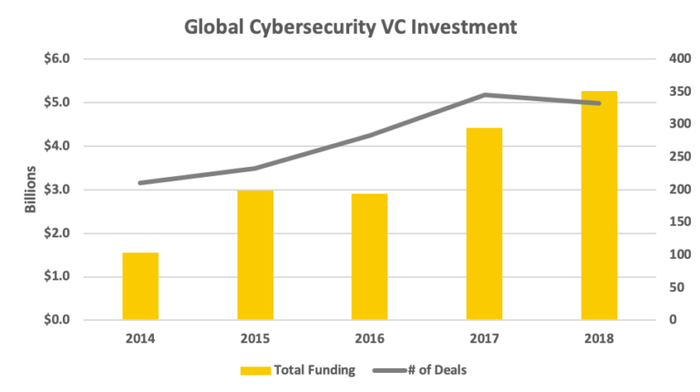Cybersecurity investments on the up but not sustainable – study
Research from Strategic Cyber Ventures points to an increased appetite for cyber security investments, but the euphoria sweeping the segment forward is not sustainable.
January 21, 2019

Research from Strategic Cyber Ventures points to an increased appetite for cyber security investments, but the euphoria sweeping the segment forward is not sustainable.
On numerous occasions we have commented security is the ugly duckling of the technology world. It is critical to ensure the industry, and digital society on the whole, functions appropriately, though more often than not it is ignored. There will be numerous reasons for this, perhaps because security is a thankless and often impossible task, but the data suggests 2018 might have been a watershed year.
Not only did 2018 see $5.3 billion in global venture capital funding, 81% more than 2016, M&A activity increased as did private equity investments. On the M&A side of things, Cisco made a bang with a $2.4 billion acquisition of Duo Security, while Blackberry acquired Cylance for $1.4 billion. These are two of the larger deals, though there was increased activity in the segment across the period.
In terms of private equity, Barracuda Networks was acquired for $1.6 billion by Thoma Bravo, Bomgar by Francisco Partners for $739 million, while Blackrock spent $400 million on Cofense. Elsewhere in the more complicated financial world, Skyhigh Networks acquired McAfee with assistance from its financial sponsors Thoma Bravo and TPG Capital.

Overall, the trends for the security segments are heading in the right direction. Perhaps now this is an area which will be taken more seriously by the industry, with adequate investments heading into security department.
That said, Strategic Cyber Ventures has warned the trends from a funding perspective are not exactly the most favourable. The amount of cash being invested is increasing, though it does not appear the rewards are reflecting this. Some of these companies have raised funds through big rounds, but growth has slowed, perhaps due to vendor fatigue or increased competition. The risk here is firms cannot raise additional funds at increased valuations from prior rounds, meaning they will have to lean on existing investors. Eventually these parties will grow tired of keeping them alive for minimal rewards.
The issue here is the need and hype around security. Its critical to secure the expanding perimeter of the digital economy, creating the need for the segment, while executives constantly talk about security being a number one priority of firms, creating the hype. This would seem to be the perfect recipe for investment in security companies and start-ups. However, the segment hasn’t taken off, perhaps due to the preference of customers investing in technologies which will make the company money as opposed to more secure?
This is maybe the most accurate assumption on why the security segment has faltered continuously over the years. Companies have limited spending power with executives choosing to invest in areas which will make the company more profitable, such is the pressure from investors and shareholders. However, consumer attitudes might be changing.
While many would have ignored the security risks of the digital economy in years gone, today’s consumer is more educated. Privacy scandals have demonstrated the power of data forcing the consumer to consider security more critically. This might have an impact on future buying decisions.
According to research by Onbuy.com 60% of US and 44% of UK consumers believe there is a risk to personal safety in the sharing economy, while 58% of all the respondents believed the risks outweigh the benefits in the sharing economy. Such attitudes will force companies to consider their security credentials as there is now a direct link back to the bottom line.
What this means for VC funding and investments from around the ecosystem remains to be seen, though the tides are turning in favour of the security segment. As Strategic Cyber Ventures notes, the current levels of investment are unsustainable, but there certainly are rewards.
About the Author(s)
You May Also Like











_1.jpg?width=300&auto=webp&quality=80&disable=upscale)


.png?width=800&auto=webp&quality=80&disable=upscale)